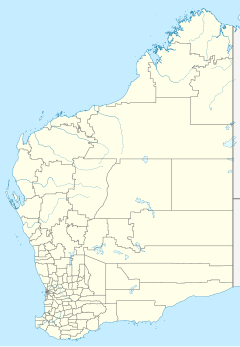Murchison House Station



Murchison House Station is a pastoral lease that once operated as a sheep station but now rears cattle and goats[1] in Western Australia.
Description
[edit]It is located approximately 12 kilometres (7 mi) east of Kalbarri and 650 kilometres (404 mi) north of Perth in the Mid West region of Western Australia.[1] It occupies an area of 350,000 acres (140,000 ha) and has a 60 km (37 mi) frontage along the Indian Ocean and a 30 km (19 mi) frontage along the Murchison River.[1] The property is mostly situated on the ancient limestone Toolonga escarpment, which was formed some 150 million years ago as a coral reef. The reef has lithified and now rises to around 180 m (590 ft) above sea level and forms the rugged terrain down the middle of the station. The landscape also includes the Murchison River flood plains and coastal dunes. The varied soil types is mostly red or black loam over limestone or sandy soils over limestone in a coastal heathland community. Pastures are composed of a mix of native and introduced grasses, mulga and wattle scrub.[2]
History
[edit]The property was established in 1858 by Charles von Bibra, who produced meat and wheat for the nearby lead mines at Galena[1] and bred Arab horses on the lease.[3] The original homestead was also constructed in 1858 from Tumblagouda sandstone and mud bricks using convict labour. The shearing shed was built in 1860 also using local materials and convict labour.[1] Von Bibra let the property to Charles Gill in 1869 then travelled to Tasmania. Andrew James Ogilvie acquired the property sometime prior to 1895[4] and it was put up for auction following his death in 1906.[5] In 1907 the property occupied an area of 99,423 ha (245,680 acres) and had a 14 room homestead, stables, staff quarters and storeroom when it was purchased by Thomas Amos Drage and his brother, William John Drage.[3] The Drages paid £18,250 for the station, including all of the stock, stores and household furniture.[6]
Western Australia's first civil aviation fatality occurred near the property in 1921 when two people died when a Bristol Tourer crashed.[7] An inquest into the crash was held at the station.[8]
In 1934 the property was stocked with about 20,000 sheep and 150 horses.[9]
An Indian prince, Mukarram Jah, the 8th Nizam of Hyderabad, acquired the property in 1972. However, his properties and business interests in India declined and/or were misappropriated in his absence, leading to Murchison House being placed in liquidation in 1996. Jah left Australia and took up residence in Turkey shortly afterwards.[10]
The shearing shed was refurbished in the 1990s after it had fallen into a state of disrepair. The shed is now used for tourist accommodation.[1]
The homestead was flooded in 2006 to a depth of over 1 m (3 ft 3 in) when the Murchison River flooded; volunteers sandbagged covered the outer walls with plastic to waterproof it.[11]
In 2017 the property was owned by Calum and Belinda Carruth. A small cache of guns was found in a cave on the property by a group of school children playing on a rock formation who came across a metal box containing a 100 year old Browning machine gun and a 30 year old Boito shotgun.[12]
The 141,600 ha (350,000 acres) property was stocked with 200 shorthorn cross cattle and around 7,000 rangeland goats in 2018.[2]
See also
[edit]References
[edit]- ^ a b c d e f "Murchsin House Station". Murchison House Station. Retrieved 22 June 2019.
- ^ a b "Getting connected". Meat & Livestock Australia. 19 November 2018. Retrieved 22 June 2019.
- ^ a b "Murchison House Station - Outbuildings and Graveyard". InHerit. Heritage Council of Western Australia. Retrieved 22 June 2019.
- ^ "Advertising". Geraldton Advertiser. No. 374. Western Australia. 30 December 1895. p. 4. Retrieved 22 June 2019 – via National Library of Australia.
- ^ "A station owner's will". Kalgoorlie Miner. Vol. 10, no. 3489. Western Australia. 30 November 1906. p. 6. Retrieved 22 June 2019 – via National Library of Australia.
- ^ "Estate of the late A. J. Ogilvie". Geraldton Guardian. Vol. I, no. 35. Western Australia. 1 February 1907. p. 6. Retrieved 22 June 2019 – via National Library of Australia.
- ^ "Earlier air crashes in this state". The West Australian. Vol. 67, no. 20, 356. Western Australia. 16 October 1951. p. 2. Retrieved 23 June 2019 – via National Library of Australia.
- ^ "Aviation Tragedy". The Examiner (Tasmania). Vol. XC, no. 289. Tasmania, Australia. 6 December 1921. p. 5. Retrieved 23 June 2019 – via National Library of Australia.
- ^ "Living on a sheep station". Western Mail. Vol. 51, no. 2, 630. Western Australia. 16 July 1936. p. 2. Retrieved 22 June 2019 – via National Library of Australia.
- ^ Mani Venugopal (25 September 2006). "How yer doin'? Mukarram". Outlook India. Retrieved 22 June 2019.
- ^ Mac Holt (9 March 2011). "SES crews rally to save homes". The West Australian. Seven West Media. Retrieved 22 June 2019.
- ^ Hannah Berry (1 October 2017). "'Incredibly exciting': School children find old guns hidden in Murchison cave". WA Today. Fairfax Media. Retrieved 22 June 2019.

